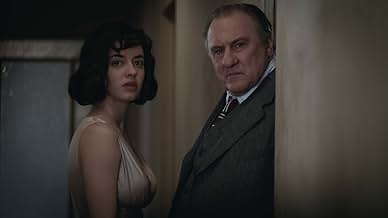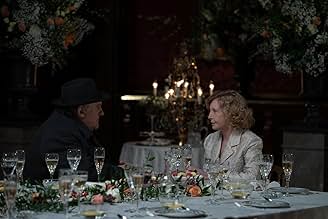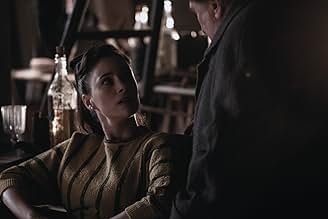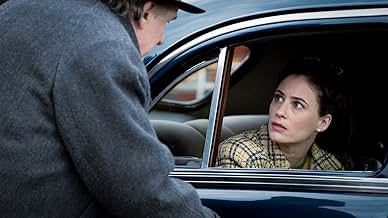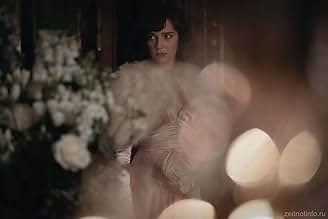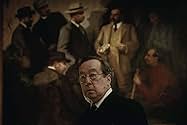Maigret
- 2022
- Tous publics
- 1h 29min
NOTE IMDb
5,9/10
3,6 k
MA NOTE
Une jeune fille est retrouvée morte dans un square parisien, habillée d'une tenue de soirée. Le commissaire Maigret va alors essayer de découvrir ce qui s'est passé derrière ce meurtre.Une jeune fille est retrouvée morte dans un square parisien, habillée d'une tenue de soirée. Le commissaire Maigret va alors essayer de découvrir ce qui s'est passé derrière ce meurtre.Une jeune fille est retrouvée morte dans un square parisien, habillée d'une tenue de soirée. Le commissaire Maigret va alors essayer de découvrir ce qui s'est passé derrière ce meurtre.
- Réalisation
- Scénario
- Casting principal
Hervé Pierre
- Docteur Paul
- (as Hervé Pierre de la Comédie Française)
Avis à la une
Slow pacing, gloomy atmosphere, linear plot, nothing original in a crime story.
Yet, it's a beautiful movie, perfectly executed.
Depardieu has a presence, seemingly effortless. Patrice Leconte has an entire career to show for.
All in all, a good movie.
Yet, it's a beautiful movie, perfectly executed.
Depardieu has a presence, seemingly effortless. Patrice Leconte has an entire career to show for.
All in all, a good movie.
Gérard Depardieu takes up the pipe to play the indefatigable commissaire Maigret. He is such an obvious casting choice with his understated intelligence, gentle wit, and hulking physique that it's a wonder he hadn't played the part before. At age 73, he is quite obviously too old for the part. He spends most of the movie leaning or sitting down and the few times we see him walk he seems barely able to amble along. But this seems to be how director Patrice Leconte has reimagined the character anyway.
His Maigret is an old man, easily tired, contemplating his mortality. He is introduced while in the middle of a doctor's appointment. He's in fine physical health we're told but the weight of the world seems to be on his shoulders. No, this Maigret is not alright. There's something severely wrong with him, a kind of emptiness eating him from the inside. He's dying and he's aware of it.
Another obvious fit for a Maigret movie is director/writer Patrice Leconte who had previously made the superb Simenon adaptation "Monsieur Hire". His direction here is curiously frigid, styleless and distant. This is not an easy movie to watch. It's so weighed down with sorrow that it becomes downright oppressive. It plays out in vast open spaces cluttered with garbage - long discarded, broken things, once useful now forgotten and in the way. His Paris resembles a post-apocalyptic wasteland which, like the one in Richard Lester's "Bed Sitting Room", bears certain signs that it was once inhabited by a civilization.
A clue as to Leconte's artistic intentions is hidden in a sombre and impactful scene in which Maigret interviews an elderly Jewish man (André Wilms) looking for a daughter he'll never find. He sits in his office surrounded by antique chairs stacked on antique desks and wrapped in cobwebs and dust. "When you lose your child you lose everything," he says, "There's nothing left. Only the night."
The plot follows Maigret as he investigates the death of a young woman found stabbed and discarded on the street like a piece of trash. He doesn't know her name or anything about her but slowly, by following the smallest clues, he pieces together her entire personality. Before he even identifies her he can say things like "she would never do that" with absolute certainty.
He finds this out by talking to various people, some of whom knew her, some of whom didn't, and some of whom are lying they didn't. These people include an actress who isn't an actress living her life on sets opening fake doors, a rich and arrogant man who lives with his mother and relies entirely on her platitudes, a judge obsessed with his pet fish, and a pharmacist who issues drugs based on her customer's faces.
The performances are excellent especially that of Jade Labeste as Betty, a poor girl Maigret encounters on the streets and whom he is determined not to allow to suffer the same fate as the girl whose death he is investigating. Labeste's charismatic, world-weary performance is the standout of the film and has a certain classical quality that reminded me of the French cinema of the 1960s. I can't wait for her to lead a film all on her own.
These small characters are the most important and their plights and the world they inhabit together are at the centre of the film. In that sense, this is one of the most accurate Simenon adaptations. What Leconte's film doesn't manage, however, is the delicate balance between character study and thriller.
Simenon knew that his psychological treatise needed a solid motor in the form of a mystery plot to keep the readers interested and the story on track. Leconte, in building up the characters, far too often lets the plot fall by the wayside. The result is a film which is intriguing and atmospheric but frequently aimless, uneven and taxing on its audience's patience.
He has little interest in the whodunnit aspect of the story which results in "Maigret" lacking a solid framework and, more importantly, a sense of narrative propulsion. Consequently, the pacing suffers, feeling alternatively too slow or too fast depending on Leconte's interest in the given scene. Exposition is quickly dealt with and the plot frequently gets muddy.
In "Maigret", I admired the ambition more than the result and the whole is less than the sum of its parts. The production design, the idea, and the performances are all superb but the film collapses under its own weight. It's a dour, depressing, hopeless sit without a strong narrative to buoy its heady artistic intentions.
His Maigret is an old man, easily tired, contemplating his mortality. He is introduced while in the middle of a doctor's appointment. He's in fine physical health we're told but the weight of the world seems to be on his shoulders. No, this Maigret is not alright. There's something severely wrong with him, a kind of emptiness eating him from the inside. He's dying and he's aware of it.
Another obvious fit for a Maigret movie is director/writer Patrice Leconte who had previously made the superb Simenon adaptation "Monsieur Hire". His direction here is curiously frigid, styleless and distant. This is not an easy movie to watch. It's so weighed down with sorrow that it becomes downright oppressive. It plays out in vast open spaces cluttered with garbage - long discarded, broken things, once useful now forgotten and in the way. His Paris resembles a post-apocalyptic wasteland which, like the one in Richard Lester's "Bed Sitting Room", bears certain signs that it was once inhabited by a civilization.
A clue as to Leconte's artistic intentions is hidden in a sombre and impactful scene in which Maigret interviews an elderly Jewish man (André Wilms) looking for a daughter he'll never find. He sits in his office surrounded by antique chairs stacked on antique desks and wrapped in cobwebs and dust. "When you lose your child you lose everything," he says, "There's nothing left. Only the night."
The plot follows Maigret as he investigates the death of a young woman found stabbed and discarded on the street like a piece of trash. He doesn't know her name or anything about her but slowly, by following the smallest clues, he pieces together her entire personality. Before he even identifies her he can say things like "she would never do that" with absolute certainty.
He finds this out by talking to various people, some of whom knew her, some of whom didn't, and some of whom are lying they didn't. These people include an actress who isn't an actress living her life on sets opening fake doors, a rich and arrogant man who lives with his mother and relies entirely on her platitudes, a judge obsessed with his pet fish, and a pharmacist who issues drugs based on her customer's faces.
The performances are excellent especially that of Jade Labeste as Betty, a poor girl Maigret encounters on the streets and whom he is determined not to allow to suffer the same fate as the girl whose death he is investigating. Labeste's charismatic, world-weary performance is the standout of the film and has a certain classical quality that reminded me of the French cinema of the 1960s. I can't wait for her to lead a film all on her own.
These small characters are the most important and their plights and the world they inhabit together are at the centre of the film. In that sense, this is one of the most accurate Simenon adaptations. What Leconte's film doesn't manage, however, is the delicate balance between character study and thriller.
Simenon knew that his psychological treatise needed a solid motor in the form of a mystery plot to keep the readers interested and the story on track. Leconte, in building up the characters, far too often lets the plot fall by the wayside. The result is a film which is intriguing and atmospheric but frequently aimless, uneven and taxing on its audience's patience.
He has little interest in the whodunnit aspect of the story which results in "Maigret" lacking a solid framework and, more importantly, a sense of narrative propulsion. Consequently, the pacing suffers, feeling alternatively too slow or too fast depending on Leconte's interest in the given scene. Exposition is quickly dealt with and the plot frequently gets muddy.
In "Maigret", I admired the ambition more than the result and the whole is less than the sum of its parts. The production design, the idea, and the performances are all superb but the film collapses under its own weight. It's a dour, depressing, hopeless sit without a strong narrative to buoy its heady artistic intentions.
Depardieu plays in this movie a french detective, but he doesn't play Maigret. Slow and boring movie, good actors, but Depardieu seems had never read a book of George Simenon. Maybe his intention was not to copy Jean Gabin or Gino Cervi, but if I go the movie to see Superman, my expectation is to see him flying. In this movie I haven't seen Maigret. For example, an Epicurean lover of food and good drinking is here on a diet, he does not smoke a pipe. Depardieu is too fat and immobile to try to transfigure the famous policeman. Depardieu here seems too sad and unhappy, but, I repeat, he's not Maigret.
Maigret's authenticity in every aspect is most remarkable. Expressive visuals of a decay to which dreamers flock. A hulking father too old and worn to save daughters of the city presented with a effortless performance. Though it's origins are infrequent Maigret is a welcoming experienced experience .
Methodical, old-fashioned whodunit, with perhaps the no 1 icon of French cinema for the past 4 or so decades finally playing perhaps the most iconic French detective in film history. And he is perfect as an old, down but not out Maigret; capturing his weariness from the passage of time, but also his determination to see justice done one more time. The mystery is short on suspects, but I liked the script's step-by-step structuring, with each small clue leading Maigret to the next one. Leconte does a fine, atmospheric job; with him at the helm, Depardieu in the main role and a more complicated script, the next Maigret movie (assuming it gets made) should have real potential. *** out of 4.
Le saviez-vous
- AnecdotesMaigret's comment "But this is not a pipe ... That's a Belgian joke to cheer us up." (from English subtitles) refers to René Magritte's painting, 'The Treachery of Images' (aka 'This Is Not a Pipe' or 'Ceci n'est pas une pipe').
- ConnexionsFeatured in Rembob'Ina: Maigret (2022)
Meilleurs choix
Connectez-vous pour évaluer et suivre la liste de favoris afin de recevoir des recommandations personnalisées
- How long is Maigret?Alimenté par Alexa
Détails
- Date de sortie
- Pays d’origine
- Site officiel
- Langues
- Aussi connu sous le nom de
- Maigret et la jeune morte
- Lieux de tournage
- Le Vésinet, Yvelines, France(Clermont-Valois' manor, 52 Av. G. Clemenceau)
- Sociétés de production
- Voir plus de crédits d'entreprise sur IMDbPro
Box-office
- Montant brut mondial
- 5 942 128 $US
- Durée
- 1h 29min(89 min)
- Couleur
- Rapport de forme
- 2.35 : 1
Contribuer à cette page
Suggérer une modification ou ajouter du contenu manquant


